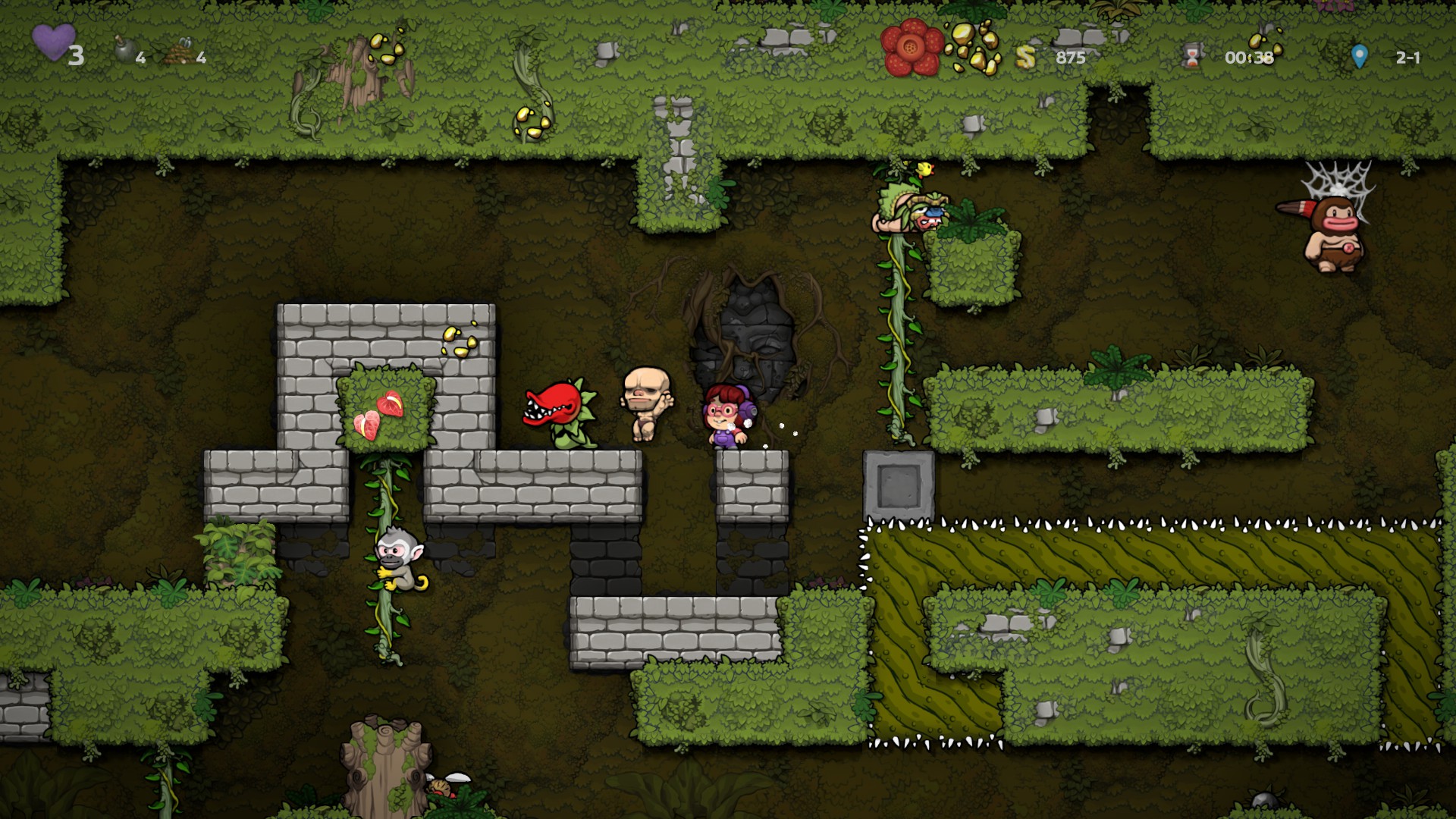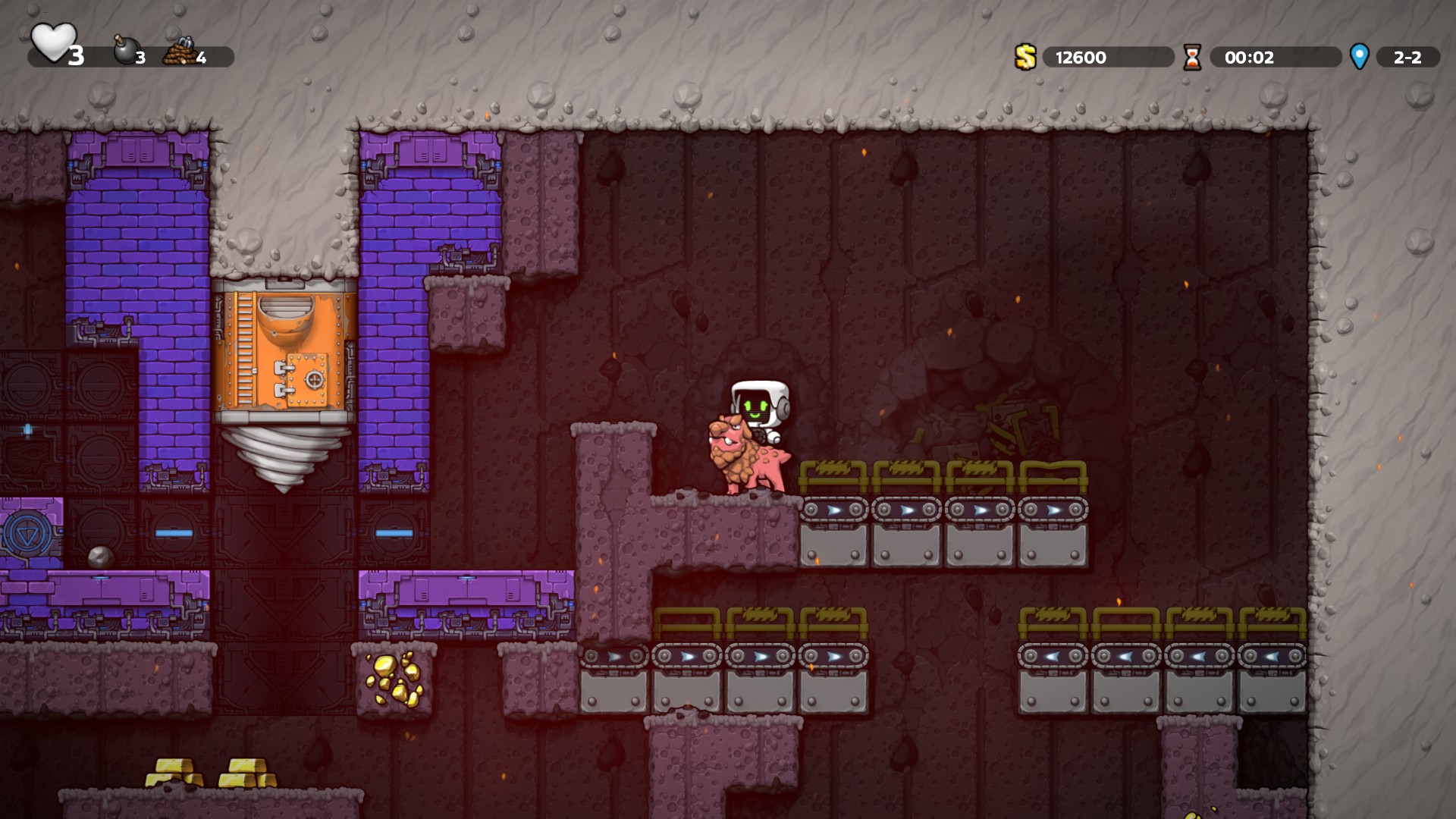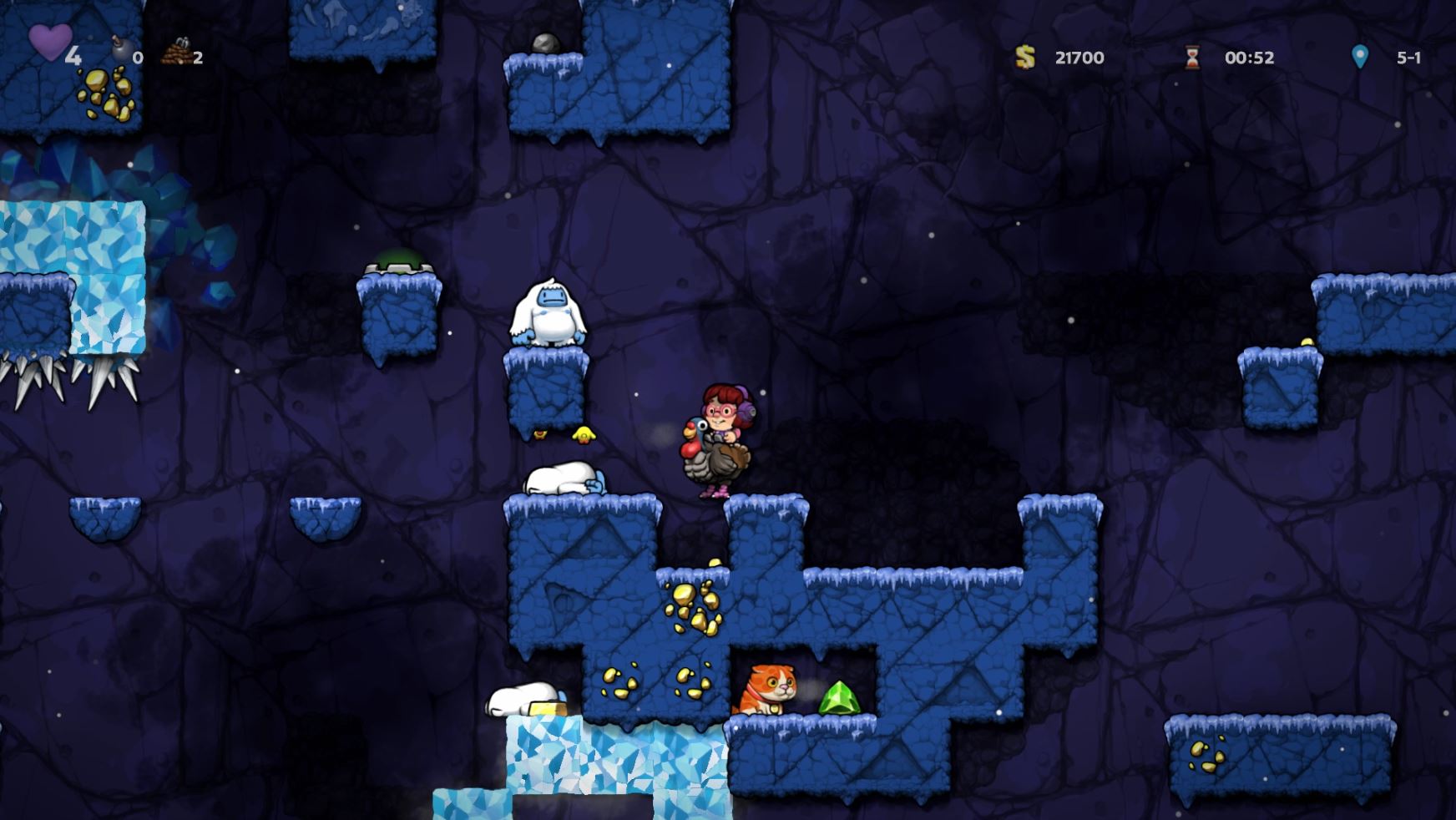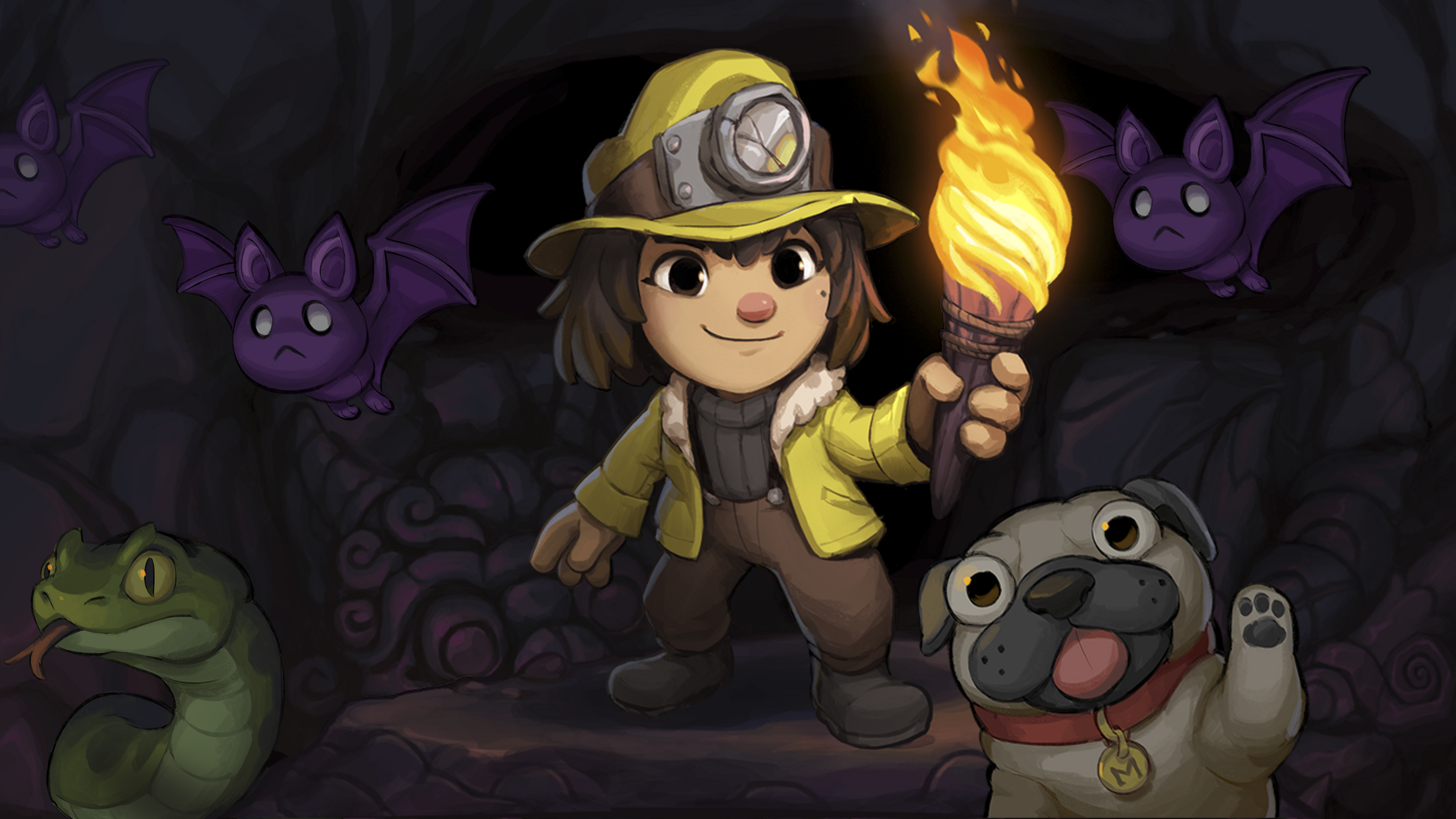What is it? An iterative sequel to a modern roguelike classic.
Expect to pay: $20
Developer: Mossmouth
Publisher: Mossmouth
Out: September 29, 2020
Reviewed on: Core i5-2500K, 8GB RAM, GTX 780 Ti
Multiplayer: Online cooperative, local deathmatch
Link: Official Site
You can kill cavemen in their sleep in Spelunky 2. That’s the kind of game it is: ultra-violent. At the time of writing I’ve died nearly 400 times, which is not very many times to die in a Spelunky game. I’m just getting started. Everything can be going right in Spelunky 2—you can be carefully setting off arrow traps, you can have a shotgun, you can have plenty of bombs and ropes—and then a deluge of very unfortunate shit will annihilate you quicker than you can say “eggplant run”.
Released in 2013, the original Spelunky was a 2D roguelike phenomenon (and PC Gamer Game of the Year) spawned from a freeware pixel art gem. Spelunky 2 is better and more: there are more worlds, more secrets, interlocking paths, you can ride axolotls and “rock dogs,” and the causes of death have at least tripled. It’s a roguelike platformer loaded with lethal interlocking threats, with a whimsical veneer you should not let fool you.

This is the kind of sequel that risks making its predecessor redundant. Certain worlds return from the original in a slightly changed form, such as the jungles, the ice caverns, and the caves (now called ‘Dwelling’). An angered shopkeeper is still a pain in the ass, albeit slightly easier to rob, and he now has competitors vying for your gold: There’s a walrus with a dice game and bodyguard, there’s Tun with her challenge rooms, and cavemen have evolved enough that they’ll now try to sell you useless crap like skulls, God love ’em. There are more NPCs and more side quests, such as the guy in Dwelling who wants you to rescue turkeys (and will kill you if you try to rob them), and Van Horsing in Volcania who gives you money for some reason, no questions asked.
And for a while you’ll probably vigilantly ignore all these distractions, focusing instead on unlocking shortcuts, before realising it’s best to ignore the shortcuts on your path to finishing the game. This critical path starts in Dwelling and culminates in a mini-boss before branching off into two possible second worlds. The game is front loaded with overly familiar areas, but it reserves its most resplendent and surprising locations for players who have the patience to surmount those initial challenges.
Spelunky 2.0
It’s fair to be concerned that Spelunky 2 is a bloated version of a near perfect formula. All the features heavily marketed pre-launch, like layered worlds and branching paths, aren’t nearly as complicated as they could have been. No one’s going to get lost in Spelunky 2. Some of the levels are much larger than before, but the general Spelunky rule still (mostly) applies: Go downward and find the exit. Mini-bosses are the kind that will be manageable with one’s eyes closed after a couple of attempts, and, at first, mostly serve as mechanisms to select which world to visit next.

What’s that giant drill in Volcania? Why’s this guy giving me gold for free?
Still, only the dedicated are going to finish this game. The new opening world is preparation for this truth: It’s harder than the two following areas, adding some truly nasty bastards like the burrowing cave mole and barrel-rolling horned lizard. The fact that Spelunky 2 will be incompletable for all but the most determined and patient is utterly beside the point though, because Spelunky 2 is another comedic, beautifully physical anecdote generator. After nearly 40 hours of play I’m still discovering new world states, just as I’m still falling afoul of those damned purple bats.
Other modern action roguelikes are similarly joyous on a base level: take Flinthook, or Enter the Gungeon. But neither they (nor any others) really begin to rival Spelunky 2 when it comes to the sheer scale of the thing. It’s true that you can play a dozen consecutive runs without encountering anything of particular note, but then you’ll enter the Jungle and there will be goddamned vampires in it. Or Volcania will have a weird industrial production line. Or you’ll find a rideable fish that can teleport you (usually into a wall). Or you’ll accidentally let a boss crush through another layer of its lair, unearthing a whole new world.
What most excites me about Spelunky 2 is all the stuff other challenge runners and secret finders are going to do. This new world is as riddled with telltale signs of undiscovered secrets as it is by amusing new ways to die. It’s lousy with reasons to diverge from the critical path, and forsaking a promising run in order to experiment with a possible secret is usually too tempting to deny. What’s that giant drill in Volcania? Why’s this guy giving me gold for free? How do I access the City of Gold? At the time of writing, no streamer has accessed all of this game’s worlds yet, but they’ve found plenty of weirdness.

Spelunky 2 feels busier than the original. There’s a lot going on at once. The graphics are chunkier and the controls a tad more sensitive. Enemy hitboxes seem especially fine tuned—you’re going to want to jump right on top of a snake’s head, not close enough. As with the original, using a controller is highly recommended, and while there’s no online cooperative play at launch (it had some teething problems on PS4) it’ll support crossplay with console players when it does.
It’s hard to make a call on whether Spelunky 2 is better than Spelunky. Spelunky was already the best. This sequel provides a clean slate for secret hunters and speedrunners, and it’s a game designed as much to be spectated as it is to be played. It’s less a sequel and more a 2.0: a place for newcomers to start that’s also swollen with mysteries and feats for veterans to tackle. A part of me wonders what its creators could have done instead of make this sequel, which is effectively an iteration. But I’m not going to argue with more Spelunky: a truly ultra-violent game you can play with your kids, ridden with fathomless secrets, magical gif moments and killable sleeping cavemen.
